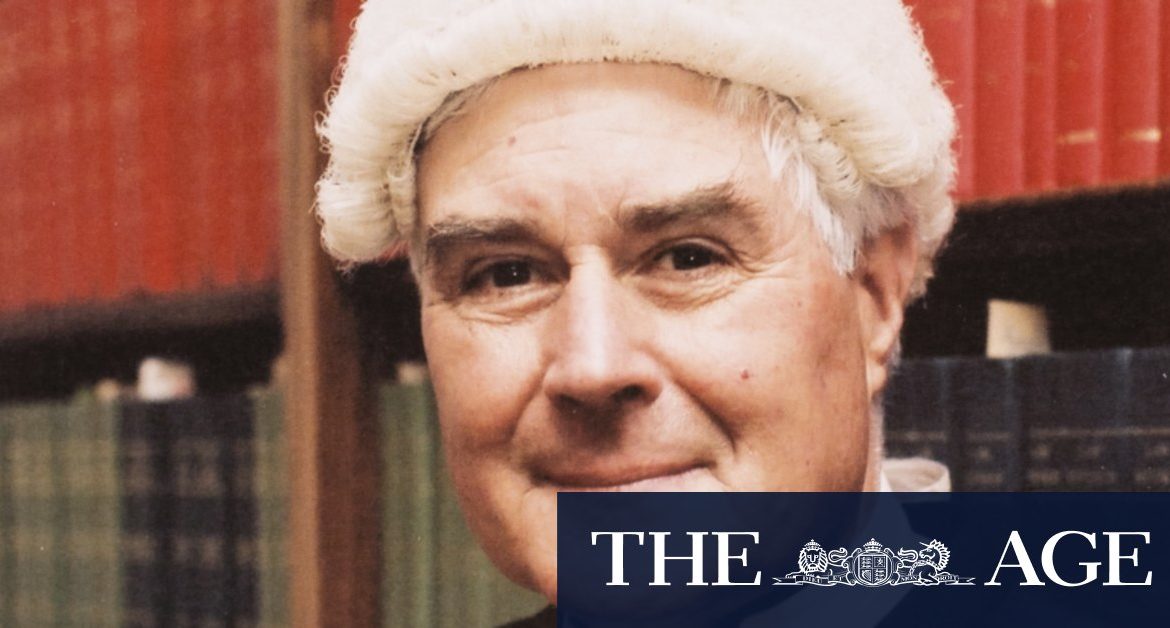Henric Nicholas at Ku Chi Tunnels in Vietnam, 1993.
The name “Henric” derived from his Tasmanian forebears, many of whom had adopted the name in memory of Lance Corporal Henric Nicholas (a Gallipoli veteran) of the 111 Regiment Light Horse who died on the battlefield at El Romani in 1916. Indeed courage and valour was genetic. His father had manned a machine gun during the battle of El-Alamein.
He boarded at The King’s School and was then in residence at St Paul’s College at the University of Sydney from which he graduated in arts and law in 1964.
His first job, after a stint overseas with the International Commission of Jurists in Geneva, was as a solicitor at Stephen, Jacques and Stephen (now King & Wood Mallesons), where he stayed for two years. He was admitted to the Bar on October 21, 1966.
On September 27, 1969, he married Marion (Minny) Macdonald. Minny wrote for numerous mastheads and was a much-loved and revered journalist whose weekly contributions were eagerly awaited. They adored each other and were inseparable. They had three children.
Never one for idleness, in the early years he filled his spare time coaching rugby at Sydney University and was elected vice-president of the Council for Civil Liberties. During daylight hours he expanded his practice at the bar from the Sixth Floor in Phillip Street, which he joined in February 1971, under the watchful and skilled presence of Michael McHugh QC. His practice flourished. He became the leading junior counsel in the area of defamation law and practice. He could turn his hand to anything by reason of his exceptional cross-examination skills and was appointed Queen’s Counsel in September 1981.
He would regularly host drinks in his chambers, affectionately called “The Tavern”. Despite the best endeavours of some of his colleagues, he remained fiercely loyal to Johnnie Walker Red Label as opposed to a single malt.
It was no surprise that his practice as a silk, especially in defamation, expanded exponentially even against such competition as Tom Hughes QC, Alec Shand QC, Murray Gleeson QC and of course McHugh QC himself. But the fierce competition did not prevent each and every one of them being his friends. He appeared in cases in all Australian courts and jurisdictions including one of the last cases to go from Australia to the Privy Council in October 1985.
On one memorable occasion, he could not avoid an unpleasant task when Tony Abbott and his wife, and Peter Costello and his wife sued Random House, again for defamation. This time no jury. The publication was a book entitled Goodbye Jerusalem, written by Bob Ellis. A major problem confronted the publisher, and hence its counsel. The central allegations made about the plaintiff, it had to concede, were false. Worse, the allegations were unseemly. Not a good start. Indeed, the publisher decided to withdraw the book from sale, but the trial proceeded. Nicholas had to cross-examine two senior ministers of the Crown and their wives in less than ideal circumstances, which he executed with courtesy and grace.

Henric Nicholas when he was a judge with Chief Justice Jim Spigelman around 2003.
One of the last cases he did as a barrister was for the Versace fashion empire. Frank Monte, a private investigator, had written a book titled The Spying Game in which he claimed to be a confidante of Gianni Versace. Monte said Versace had told him that the empire – but more to the point Gianni’s sister Donatella and his brother Santo – were involved with the Mafia and other serious allegations. All these were published in the book. Following meticulous preparation and most effective cross-examination, the trial judge accepted each of Nicholas’s arguments as to why Monte’s story was false and misleading, and that Monte never had a relationship with Gianni Versace as alleged. Nicholas, although he enjoyed dealing with his Milanese clients, found the rather lavish presents of the Versace ties not quite in keeping with his wardrobe.
It was only a matter of time before he would become a judge. He was appointed to the Supreme Court on February 5, 2003. He sat in the Equity Division of the Court. Another family tradition was satisfied as his grandfather Harold Sprent Nicholas was also a judge of the court who was appointed a judge in the Equity Division in 1935. In 1939 he was appointed chief judge of the division.

Henric Nicholas after the Pyongyang marathon in North Korea in April 2015.
Nicholas served on the court for 10 years, briefly returning as an acting judge before finally retiring about 2015. He wrote his judgments promptly, duly respectful of precedent but the finished product was always imbued with overwhelming common sense. When Tom Hughes (now 97) was told of his death this week, although clearly distressed, said in quintessential Hughes style and clarity, “He was a very good judge but above all else a very good man”.
Through the whole of his time as a barrister and a judge the law alone did not, nor could it, occupy him entirely or satisfy his curiosity.
Between 1988 and 2001 he ran a small Aberdeen Angus stud at Willow Tree and was a regular exhibitor at agricultural shows including the Royal Easter Show. He chose “Pales” as the name of the stud. It was, he explained, the obvious choice because in ancient Roman religion Pales was a deity of shepherds, flocks and livestock. Initially annoyed, he soon coped with his many winning exhibits being identified as another fine specimen from the “Pails” stud, Willow Tree.
He was at various times chairman of the NSW Publications Classifications Board, part-time assistant commissioner at the Independent Commission Against Corruption (NSW), director of the Sydney Theatre Company, director of the Centennial Park Trust, chairman of the Eleanor Dark Foundation/Varuna Writer’s Centre Katoomba, chairman of the Council of St Paul’s College, a councillor of the Royal Agricultural Society of NSW, chairman of the Kimberley Foundation of Australia and director of the Blake Society for Religious Art. He served on the Council of the NSW Bar Association and was a director of Council’s Chambers Limited and served on the Ethics Committee for Westmead Children’s Hospital.
If that was not enough he, along with Minny, was actively involved with the Rural Fire Service, as vice-president of the Mt Wilson/Mt Irvine Rural Fire Service Brigade. He also served as a regular volunteer making toasties for the homeless as part of the food program at St Canice’s Rushcutters Bay.
In the past six or so years he, with Minny always by his side, faced three bouts of cancer which he endured with equanimity, courage and humility. In a call to inquire as to his current state of health he would inevitably change the topic to the health of the inquirer. He was ever uncomplaining.
Henric Nicholas died on January 24, 2021, at Prince of Wales Hospital. He is survived by Minny, children Grace, Edward and Hugh and their partners Tom, Sarah and Emmy along with eight grandchildren.
Most Viewed in National
Loading







